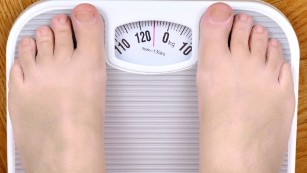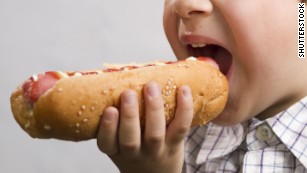Ultra-processed
foods are not known for their health qualities. We know this, yet it's
hard to resist the doughnuts your kind colleague brought into the
office. Now, research published Wednesday in the BMJ may give you at least a longer pause before you pick the pink one with sprinkles.
 Researchers discovered that people who eat more ultra-processed foods
have a higher risk of cancer. Such foods are the ones with
unrecognizable and unpronounceable words on the list of ingredients --
anything from the candy that turns your tongue blue to
healthier-sounding canned soups packed with artificial flavors,
additives or emulsifiers. Most food is processed to some degree, but
ultra-processed foods are typically much more calorie-, sodium- and sugar-packed.
Researchers discovered that people who eat more ultra-processed foods
have a higher risk of cancer. Such foods are the ones with
unrecognizable and unpronounceable words on the list of ingredients --
anything from the candy that turns your tongue blue to
healthier-sounding canned soups packed with artificial flavors,
additives or emulsifiers. Most food is processed to some degree, but
ultra-processed foods are typically much more calorie-, sodium- and sugar-packed.
 What
the scientists found was that a 10% increase in the proportion of
ultra-processed foods in the diet was associated with a significant
increase of greater than 10% in risks for overall cancer and breast
cancer.
What
the scientists found was that a 10% increase in the proportion of
ultra-processed foods in the diet was associated with a significant
increase of greater than 10% in risks for overall cancer and breast
cancer.
 Sanders,
who was not involved in the study, said the authors made statistical
adjustments to accommodate for some of that, but he cautions that "the
approach of categorizing dietary patterns that depend on industrially
processed food in relation to disease risk is novel but probably needs
refining before it can be translated into practical dietary advice."
Sanders,
who was not involved in the study, said the authors made statistical
adjustments to accommodate for some of that, but he cautions that "the
approach of categorizing dietary patterns that depend on industrially
processed food in relation to disease risk is novel but probably needs
refining before it can be translated into practical dietary advice."
 Researchers discovered that people who eat more ultra-processed foods
have a higher risk of cancer. Such foods are the ones with
unrecognizable and unpronounceable words on the list of ingredients --
anything from the candy that turns your tongue blue to
healthier-sounding canned soups packed with artificial flavors,
additives or emulsifiers. Most food is processed to some degree, but
ultra-processed foods are typically much more calorie-, sodium- and sugar-packed.
Researchers discovered that people who eat more ultra-processed foods
have a higher risk of cancer. Such foods are the ones with
unrecognizable and unpronounceable words on the list of ingredients --
anything from the candy that turns your tongue blue to
healthier-sounding canned soups packed with artificial flavors,
additives or emulsifiers. Most food is processed to some degree, but
ultra-processed foods are typically much more calorie-, sodium- and sugar-packed.
Research has long showed that people who live on ultra-processed food tend to be more obese and overweight. They're also more likely to have heart and circulation problems or diabetes, studies have found. Eating a lot of processed meat like hot dogs has also been tied to an increased risk of colorectal cancer.
Researchers saw this new cancer link when they analyzed 24-hour dietary records of nearly 105,000 adults in the NutriNet-Sante cohort,
a general population group in France. The individuals recorded what
they ate from a list of 3,300 food items that were then categorized by
how processed they were, using a system called NOVA.
 What
the scientists found was that a 10% increase in the proportion of
ultra-processed foods in the diet was associated with a significant
increase of greater than 10% in risks for overall cancer and breast
cancer.
What
the scientists found was that a 10% increase in the proportion of
ultra-processed foods in the diet was associated with a significant
increase of greater than 10% in risks for overall cancer and breast
cancer.
"Ultra-processed
fats and sauces, sugary products and drinks were associated with an
increased risk of overall cancer," the study says. "Ultra-processed
sugary products were associated with an increased risk of breast
cancer."
People who tended
to eat more ultra-processed food also tended to smoke more and exercise
less than the others, but the authors controlled for these issues and
still found the elevated cancer risk.
"It
was quite surprising, the strength of the results. They were really
strongly associated, and we did many sensitive analysis and adjusted the
findings for many co-factors, and still, the results here were quite
concerning," study co-author Mathilde Touvier said.
"What
people eat is an expression of their lifestyle in general and may not
be causatively linked to the risk of cancer. So it is necessary to rule
out what are called cofounding factors," said Tom Sanders, scientific
governor of the British Nutrition Foundation and an emeritus professor
at King's College London.
 Sanders,
who was not involved in the study, said the authors made statistical
adjustments to accommodate for some of that, but he cautions that "the
approach of categorizing dietary patterns that depend on industrially
processed food in relation to disease risk is novel but probably needs
refining before it can be translated into practical dietary advice."
Sanders,
who was not involved in the study, said the authors made statistical
adjustments to accommodate for some of that, but he cautions that "the
approach of categorizing dietary patterns that depend on industrially
processed food in relation to disease risk is novel but probably needs
refining before it can be translated into practical dietary advice."
The nonprofit trade group Association of Food Industries did not respond to requests for comment.
Marji McCullough, strategic director of nutritional epidemiology at the American Cancer Society, suggests caution about interpreting what is responsible for the cancer risk associated with ultra-processed food.
"This
study doesn't mean that people should think 'if I eat this cracker, I'm
going to get cancer,' " McCullough said. "The overriding message of
this study was really to look at an overall diet pattern rather than a
specific ingredient, and it supports a lot of what we already know."
For
example, she said, people eating more highly processed foods are
probably eating fewer healthy foods, which may help prevent cancer.
Nutritionists recommend a diet rich in whole grains, whole fruits and
vegetables instead of foods that have little nutritional value.
Touvier
also noted that it's an observational study, meaning scientists don't
know what exactly is causing the increased cancer risk, but her group at
the Sorbonne Paris Cité Epidemiology and Statistics Research Center
plans to look closer at what the connection may be. "The challenge now
is to disentangle the different foods and understand this relationship
to see what specifically is having this effect."
Animal
studies have shown that some additives are "quite good candidates" for
being carcinogenic, Touvier said, "but that would need to be seen if
they are also carcinogenic in the human population."










Aucun commentaire